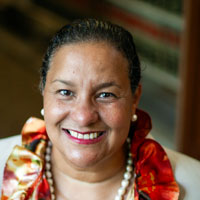Warigia Bowman, J.D., Ph.D
Professor of Law
University of New Mexico Law School
Biography
Warigia M. Bowman currently teaches water law, administrative law, natural resources and property at the University of New Mexico School of Law. Her work has been cited in the New York Times, and she is a sought after water expert who has been interviewed by PBS, CNN, and Democracy Now. Bowman has extensive law and policy experience in local, state and federal government, as well as in the non-profit sector. Bowman has published widely on telecommunications and regulatory issues and has consulted for the Kenyan Government, USAID, the United Nations, and the U.S. State Department. Before joining The University of New Mexico, she taught at the University of Tulsa, the American University in Cairo, Egypt, during the revolution of 2011, as well as at the University of Mississippi and the University of Arkansas.
Why Africana Studies
My desire to affiliate with the Africana Studies Department is rooted in my passion for the continent, the diaspora, and my commitment to the preservation and celebration of indigenous knowledge. I am guided by the principles of Kujichagulia (self-determination), Ujamaa (cooperative economics), and Nia (purpose). Africana studies reminds us that we are part of a larger community and that we have an obligation to help that community thrive. I have conducted significant fieldwork in Kenya, Uganda, Rwanda, and Tanzania. I have taught at the university level in both Kenya and Egypt. My time in Africa has reinforced my sense of self, and enriched my understanding of the connections between the continent and the African American diaspora. I am inspired and motivated by ideas of reducing inequality, both in the United States, and between the Global North and the Global South. I am extremely interested in preserving indigenous folkways and languages for people such as the Maasai and the Great Lakes Twa. I am also interested in narratives of self shaped by immigration, and how immigrants find ways to maintain their life ways and traditions while simultaneously attempting to integrate into the expectations of their new host countries. I love the Kiswahili language, and hope to master its complex grammar one day. Part of my inspiration is my uncle, Wacira Gethaiga, who helped to found Afro-Ethnic studies at the University of California, Fullerton.

